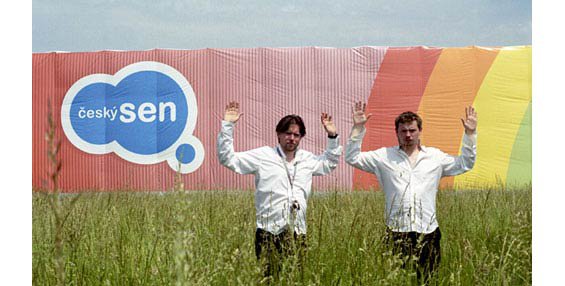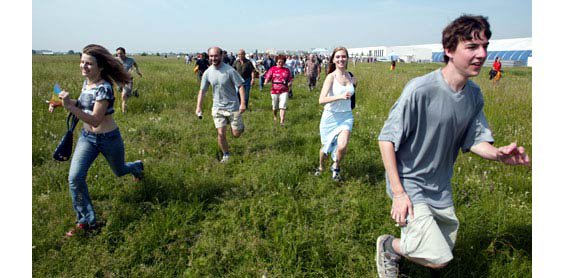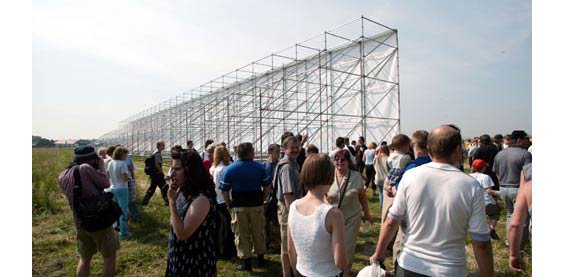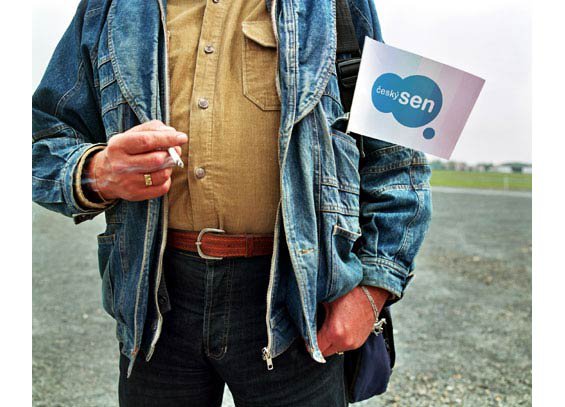Whenever I arrive in Prague these days and see the city encircled by Europes biggest hypermarkets, a comparison with the old grey days of Communist Czechoslovakia comes to mind. I suspect all Czechs of a certain age have that stark contrast lying around somewhere in their unconscious. Filip Remunda & Vit Klusak, two young Czech filmmakers, get it absolutely right in their film Czech Dream (Český Sen) by starting with flashbacks.
We used to have a colourless land with everybody waiting to get something they needed or for something to happen. It was a grey place where time got stuck. The film opens with black-and-white reminders of the omnipresent police, slogans everywhere and people standing in queues waiting waiting for a kilo of bananas, half a kilo of oranges. The clever ones, the well informed, those who bribed and had the money knew when and where to be to get what everybody wanted but not everybody could have.

Suddenly, with the velvet revolution in 1989, colour, sound and life broke into the country. Markets, supermarkets and hypermarkets were standard-bearers of this new life and more welcome than anyone in the west can probably imagine, because of the freedom and prosperity they symbolised. But where do we find ourselves fifteen shopping years on?
Czech Dream is an 87-minute spoof documentary exploration of the absurdities the nation now finds itself caught up in. Remunda & Klusak describe it as a subversive penetration into a world that an ordinary person usually doesnt have the chance to enter, the playground of the CEOs of international corporations, marketing consultants, but also politicians. They commissioned a campaign to promote a hypermarket that didnt exist in reality and watched how both manipulators and manipulated reacted. They hired a top advertising company, visited style consultants for a personal makeover, invested in psychometric tests about consumer choice. The professionals obliged with a brilliant plan.
The advertising campaign was built on the principle of the so-called teaser. In other words suspense and mystery, explain Remunda & Klusak. The adverts said Dont go there! Dont spend your money! Dont queue up! Opening 31 May at 10am. Where? Youll find out soon.
More than 4,000 people certainly did. Come 31 May the campaign in the street, on radio and TV, in the metro, was so successful that young and old, fit and disabled, customers ranging from the vaguely interested and the passionately keen, turned up for the opening of a non-existent hypermarket on the outer ring road. They found themselves beating a path through the long grass to a façade labelled Czech Dream The Hypermarket for a Better Life.
The film has already carried off several international awards. Its a documentary, but immediately reminiscent of the new wave of Czech films in the 1960s, which famously included Milo Formans The Firemens Ball. Remunda & Klusak were not working in a genre where they could create characters at will. Forman could, but his work with non-actors doing their real jobs produced disarmingly similar results. What both sets of directors did was touch on the very uneasy relationship between reality and fantasy in daily life, nothing to do with art. The fallout from both films was extraordinary and once again similar.
In Formans case firemen, the length and breadth of Czechoslovakia felt offended. Remunda & Klusaks film provoked national outrage. What happened in both cases was that the material of daily life, taken at face value in public debate, transcended its own role in the film. Remunda & Klusak, posing as hypermarket managing directors, became real actors in a rich Czech tradition. The amateur comedy duo is as much part of Czech tradition as Laurel & Hardy and Morecambe & Wise.

When a hoax becomes art
One of the films revelations was the way the marketing professionals were willing to be complicit in the farce. In fact they gave their services for nothing. When asked why, an executive of the leading advertising agency said:
Why am I doing it? I love my job. I know it is me who can move the world. When Michelangelo was commissioned to paint the Sistine Chapel, he was simply doing what we are doing. He was not commissioned to do art, he was there to deliver an advert.He went on to explain that the advert was the real thing, not the product being promoted. A vague sense of moral unease was all one leading researcher into consumer behaviour felt, although, having passed the buck to the filmmakers its your responsibility what you do with our findings she ended by putting her hand up to block the lens.

So, the hungry 4,000 are running or hobbling to be first through the door of Czech Dream: The Hypermarket for A Better Life. How do they react to finding nothing there? The camera catches immediate reactions of embarrassment and disappointment. A few are angry; many are resigned, just as they would have been in the old days. Remarkably, apart from a few boys who throw stones at a hoarding, no one is violent. Having consulted the army on crowd behaviour, Remunda & Klusak risked exposing themselves to close contact with the crowd, but contrary to military wisdom, no one so much as laid a hand on them.
What are Czech people: decent and peaceful or fearful, cowardly, and used to fitting in? For one reason or another, time and again, when others in the world react violently, they dont. The closing scenes of this film reminded me poignantly of the velvet revolution.
When the hoax hit the press, reactions were extraordinary for other reasons. Politicians and the media declared this low-budget film had wasted public money. Supported by Czech Television, it had received 1.5 million Czech Crowns (£35,000) from the State Fund for the Support and Development of Czech Cinematography. Meanwhile 20% of the nation still believed the hypermarket existed. Thus the film continued in reality.

In familiar fashion the humiliated consumers at the end of the film diverted their anger into blaming someone or something: the filmmakers for lying, us Czechs for being a nation of idiots, and, indirectly, politicians who make fools of us every day. But the most absurd aggression was reserved for the European Union. The hoax coincided with the government campaign for a yes vote and many people were quick to see both as equally fraudulent. Theyre lying to us. Is that how we are going to enter the EU? On the spot, a Eurosceptic decided to vote against accession.
The real social reality that only peeps through the film is chilling. The prime minister of the day and top politicians used the same advertising agency and style consultants. The popularity of the Czech Dream theme song prompted not only another far more upmarket chain but also the countrys strongest political party, the Civic Democratic Party (ODS), to steal it.
Meanwhile, amongst the tricked consumers were desperately poor pensioners who needed a bargain or just something to do. Czech characteristics continued to give the question of reality a twist to the very end. OK, said one older man out with his wife, so they had been deceived, but here they were in the middle of a field on a sunny day: what could be better?

Read more
Get our weekly email
Comments
We encourage anyone to comment, please consult the oD commenting guidelines if you have any questions.